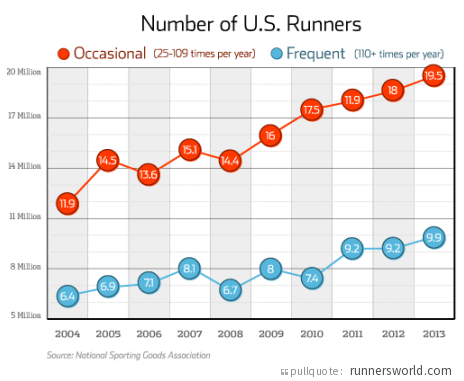Recent quotes:
School of Nursing ‘Walks’ to Wuhan, China
“Walk to Wuhan Race” helps Duke Nursing become one of the most fit nursing schools in the nation.Marathon des Sables camaradarie
His head torch is brighter than mine and lights up the dips and rocks. My eyesight is better than his and I can make out the dim glowticks that mark out the course of the Marathon des Sables, a seven-day, 250-kilometer (155-mile) race in the Moroccan desert where competitors must carry their own food. Today's stage is the longest ever in the race's 30-year history at 92 kilometers. My new friend and I spur each other along. Alex Morales during the 91.7-kilometer stage 4, the longest in the 30-year history of the Marathon des Sables. […] "For me, the best aspect of the Marathon des Sables was the camaraderie,'' Gemma Game, a 35-year-old fund manager at Norges Bank in London who placed 87th out of about 1,300 runners and was the fourth woman, wrote in an e-mail. "A passion for running united men and women, transcending differences of language, gender or nationality.''$1 billion on top 10 charity races
In 2013, the top ten powerhouses affiliating with, or holding, such events raised more than $1 billion, led by the American Cancer Society’s Relay for Life at $380 million, followed by the Susan G. Komen for the Cure’s Race for the Cure at almost $107 million, according to Peer-to-Peer Professional Forum. But six of those top ten events saw income declines, continuing a trend despite the improving economy.In long run, do charity races pay?
Rooney and his co-authors found that special events, including fun runs, generated an average of $3.20 per $1 dollar spent organizing them. Telephone solicitations, by contrast, raised almost $12 per $1 spent, the study found, while capital campaigns raised $20 for every $1 spent.The shame of being married to a MAMIL, a Middle Aged Man In Lycra

WNYC's sleep competition yields results
WNYC’s earlier sleep project in the city that never sleeps. In spring, Clock Your Sleep involved 5,200 listeners in a project that involved good reporting and then invited people to join teams, led by WNYC hosts, to “compete” for better sleep, tracking their results. The quick data: More than 40 percent of respondents said they noticed a change in their sleep since they started tracking it. 19.4 percent reported getting more sleep. 77 percent of respondents reported learning something while participating in the project.
Approximately 1,440 individuals have completed the crossing since Captain Matthew Webb did in 1875. By comparison, more than 4,000 people have climbed Mount Everest so far, including about 650 last year.
Sometime in the next week, weather and wind permitting, I’ll wade into the English Channel outside Dover in a swimsuit, cap and goggles. […] It’s a long way from the South Bend, Indiana, YMCA where I worked my way up the lessons ladder to Flying Fish. I splashed with my siblings in Lake Michigan every summer, though I didn’t like the lake at Notre Dame where minnows nibbled at my toes. […] I’ve swum in the Thames and the Hudson; Lake Zurich; around Cape May on the New Jersey shore; from Alcatraz to San Francisco; in Sicily and Slovenia. Now I’m attempting the channel because I think I can succeed.
When I hit thirty-five thousand steps a day, Fitbit sent me an e-badge, and then one for forty thousand, and forty-five thousand. Now I’m up to sixty thousand, which is twenty-five and a half miles. Walking that distance at the age of fifty-seven, with completely flat feet while lugging a heavy bag of garbage, takes close to nine hours—a big block of time, but hardly wasted. I listen to audiobooks, and podcasts. I talk to people. I learn things: the fact, for example, that, in the days of yore, peppercorns were sold individually and, because they were so valuable, to guard against theft the people who packed them had to have their pockets sewed shut. At the end of my first sixty-thousand-step day, I staggered home with my flashlight knowing that I’d advance to sixty-five thousand, and that there will be no end to it until my feet snap off at the ankles. Then it’ll just be my jagged bones stabbing into the soft ground. Why is it some people can manage a thing like a Fitbit, while others go off the rails and allow it to rule, and perhaps even ruin, their lives?
The biggest, baddest human endurance challenge on the planet has begun
13 days, 12 hours, 29 minutes, and 52 seconds

A South African couple made a big splash Friday when they capped an incredible six-month, 6,500-mile journey from Morocco to the Big Apple — via row boat.
Riaan Manser and longtime girlfriend Vasti Geldenhuys made the arduous trek in a small — but high-tech — 23-foot row boat called “Spirit of Madiba” starting on Dec. 30 and ending Friday at the Statue of Liberty.
“We were naïve. We thought the Atlantic would be this calm little pond that you just row across,” said Manser, 40, sporting a long beard and shaggy hair. “By the fifth day, we were saying to each other, what is going on? Goodness gracious. It should be a lot calmer. The sea was very, very, very angry.”
